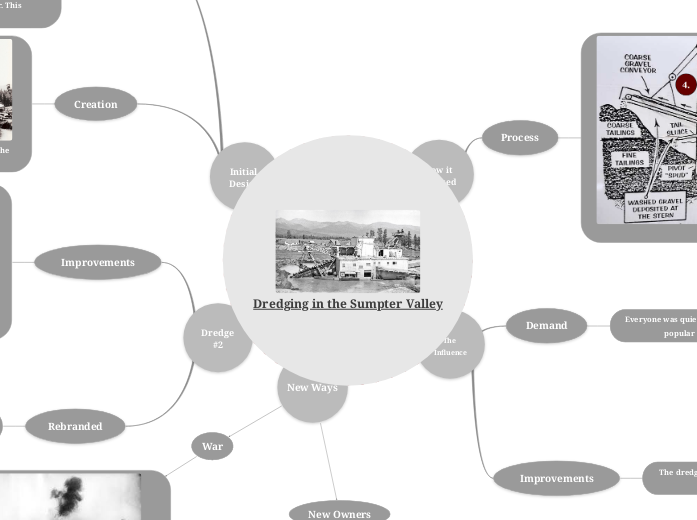Dredging in the Sumpter Valley
New Ways
New Owners
Powder Dredging Company
In 1950, Baker Dredging Company sold it to another company who went by the same name as the previous one, but are different, Powder Dredging Company.
Their goal was to catch more gold than the other dredges, but that goal backfired on them as they didn't achieve it and to run the operation become more pricey after the war.
The ended the dredging on August, 1954, and this entire project resulted in them being $100 000 in debt.
Baker Dredging Company
While being the owners of the dredge, they were able to make the efficiency of the gold recovery system go from having a 70% rate of recovery to 95% by using a jig system instead.
War
In 1942, operations like dredges were stopped due to World War ll, but start operating once again on July 5, 1945.
How it Worked
Process
The Dredge
1. Through an electric motor, a dredging bucket line would go down 65 nine cubic feet and dig at a speed of 21 buckets/minute!
2. The buckets would then dump the gold-laden into a hopper at the top of the dredge, which would be flushed forward by 36 feet by water into a trommel (a metal drum which rotates).
3. As the the material turned, another water line would "wash" it. This would result in the smaller pieces of material to drop down to the trommel's shell, while larger pieces continued towards the stacker.
4. The larger pieces would then go to the end of the dredge to be put into the piles of tailings out back.
5. The smaller pieces would be flushed by sluice boxes that had slats called riffles which would cause heavy materials like gold to be trapped, while lighter opens would also go out back.
The Influence
Demand
Everyone was quiet about dredging as it wasn't so popular anymore, until 1934.
President Franklin D. Roosevelt had raised the value of gold by $15.00 ($20.00 - $35.00) and this influenced the dredging company to create a new one!
Improvements
The dredge had many changes made to it for the better.
The dredge was larger, ran more buckets per minute, but it took twenty men to run the operation, but only 3 were necessary...
1. The Front Oiler
2. The Rear Oiler
3. The Winchman
Dredge #2
Improvements
The Powder River Gold Dredging Company decided to create a second dredge after 3 years from building the first one.
They had kept it similar to the first one, but this one only carried 7 1/2 cubic feet, instead of 9.
Rebranded
This dredge operated until 1923, as the company had broken the machine down to pieces.
The pieces were then shipped to Washington in the United States of America, to be rebuilt and renamed to Liberty Dredge.
Initial Design
Plan
A dredge was wanting to be built across Sumpter Valley, Cracker Creek and Powder River. This occurred in Oregon, U.S.A.
The Powder River Gold Dredging Company wanted to build the dredge to use it for gold mining in those areas, as you can tell from the company's name.
Creation
In 1912, a Yuba-style dredge was created in the south of the city.
It stood at 100 meters long and 45 feet wide and it was all made out of wood!
It was later shut down later on in 1924 by the company.
